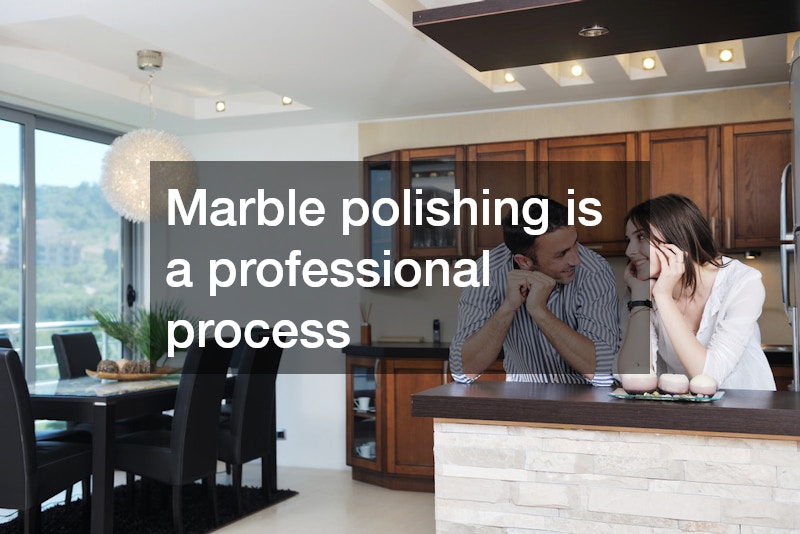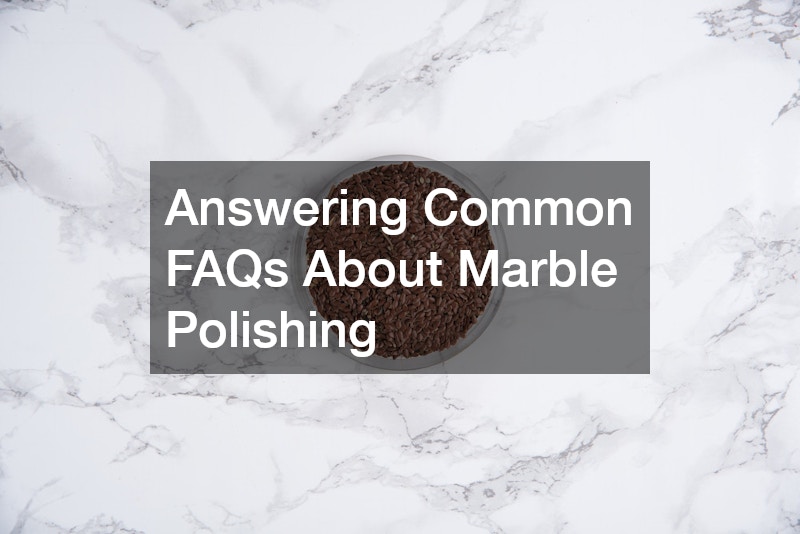Marble is a beautiful, durable, and luxurious stone that is commonly used in a variety of applications, such as countertops, floors, and bathroom vanities. However, like any natural stone, marble can show signs of wear and tear over time, especially with frequent use and exposure to the elements. One of the most common ways to restore marble to its original beauty is through marble polishing. If you’re considering marble polishing for your home or business, you likely have some questions about the process. Below, we’ll answer some of the most frequently asked questions about marble polishing.
What Is Marble Polishing?
Marble polishing is a professional process designed to restore the shine and smoothness of marble surfaces. Over time, marble can lose its glossy finish due to foot traffic, spills, and other factors. Polishing is a way to remove scratches, dullness, and imperfections, bringing the marble back to its natural luster. The process involves the use of specialized polishing compounds and machines to buff the surface, smoothing out imperfections and enhancing its shine.
How Often Should Marble Be Polished?
The frequency with which you need to polish your marble surfaces depends on several factors, such as the level of foot traffic, the location of the marble, and how well it is maintained. In high-traffic areas like kitchens or bathrooms, polishing may be needed more frequently—every 1 to 2 years. For less frequently used areas, such as formal living rooms or decorative marble features, polishing may be needed less often, about every 2 to 3 years. Additionally, regular cleaning and sealing can extend the time between polishings.
Can I Polish Marble Myself?
While DIY marble polishing kits are available, it is generally recommended to hire professional marble polishing services to polish marble. Marble polishing requires specific equipment and techniques to achieve a smooth, even finish. Improper polishing can lead to damage, such as scratches, uneven surfaces, or an overly shiny finish. Professional marble polishers have the experience, training, and equipment to deliver the best results without causing harm to your marble.
What Are the Benefits of Professional Marble Polishing?
Professional marble polishing offers several key benefits that DIY methods cannot match:
Restores Shine: Marble naturally has a beautiful shine, but over time it can become dull or scratched. Professional polishing restores this shine, bringing out the marble’s inherent beauty.
Prevents Further Damage: Polishing helps remove surface imperfections such as scratches, stains, and discoloration, preventing these issues from becoming permanent.
Increases Longevity: By removing dirt and contaminants that can penetrate the surface of the marble, polishing helps preserve the marble’s integrity, preventing long-term damage and discoloration.
Enhances Hygiene: Polishing also creates a smoother surface, reducing the ability for dirt and bacteria to accumulate. This is especially important in kitchens and bathrooms, where hygiene is a concern.
Adds Value: Well-maintained marble surfaces can increase the aesthetic appeal and overall value of your home or business. A freshly polished marble floor or countertop can make your property look more inviting and sophisticated.
How Long Does the Marble Polishing Process Take?
The duration of marble polishing depends on the size of the area being polished, the condition of the marble, and the complexity of the work required. For a standard countertop or small floor area, the process can take a few hours to a day. Larger areas or heavily damaged surfaces may require more time, sometimes up to a couple of days. A professional marble polisher will assess the surface beforehand and provide a more accurate timeline.
What Is the Difference Between Honing and Polishing Marble?
While both honing and polishing improve the appearance of marble, they serve different purposes:
Honing: Honing involves smoothing the surface of the marble to remove scratches and imperfections. It typically results in a matte or satin finish, with no glossy shine. This process is ideal for surfaces that have deep scratches or dullness, as it creates a smooth, even surface. Honing is also often used for marble floors that experience a lot of foot traffic, as it is less slippery than a high-gloss finish.
Polishing: Polishing, on the other hand, creates a glossy finish by buffing the marble surface to a shine. It is typically done after honing to further enhance the stone’s appearance and bring out its natural beauty.
In some cases, marble surfaces may need to be honed first before being polished, especially if they have visible scratches or imperfections.
Can Marble Be Polished If It’s Already Been Damaged?
Yes, marble can often be polished even if it has sustained damage, such as deep scratches, etching, or discoloration. However, the extent of the damage will determine the necessary steps. Minor imperfections can typically be polished away during the process, but more severe damage, such as deep cracks or stains, may require repairs before polishing can be done. Professionals will assess the condition of the marble and determine the best course of action to restore it.
Should I Seal My Marble After Polishing?
Sealing your marble after polishing is highly recommended. Marble is a porous material, which means it can absorb liquids and stains, leading to discoloration and damage. Sealing the marble creates a protective barrier on the surface, helping to repel stains and moisture. A professional marble polisher will often apply a sealant after polishing, but it’s also important to keep the surface sealed throughout its lifespan. Depending on usage, marble surfaces may need resealing every 1 to 2 years.
How Much Does Marble Polishing Cost?
The cost of marble polishing can vary depending on factors like the size of the area, the condition of the marble, and the location of the service. On average, you can expect to pay anywhere from $2 to $5 per square foot for marble polishing. Some services may offer additional treatments like sealing, which can add to the cost. While professional marble polishing may seem like an investment, it’s an important service that helps maintain the value and longevity of your marble surfaces.
Is Marble Polishing Worth the Investment?
Absolutely. Marble is a beautiful and durable stone, but it requires proper care to maintain its aesthetic appeal and functionality. Polishing is an essential part of this maintenance. Not only does it restore the shine and beauty of the marble, but it also extends its lifespan, preventing costly repairs or replacements down the line. Whether you’re looking to restore an old marble floor, countertop, or other surface, investing in professional marble polishing is well worth the cost.
Marble polishing is an essential service for restoring the natural beauty of marble surfaces, improving their longevity, and enhancing the overall aesthetic of your space. With the right care, marble can continue to shine for many years. By hiring a professional marble polishing service, you ensure that the process is done correctly, yielding stunning results that you can enjoy for years to come. If your marble surfaces are looking dull or worn, don’t hesitate to seek out a professional to restore them to their former glory.






